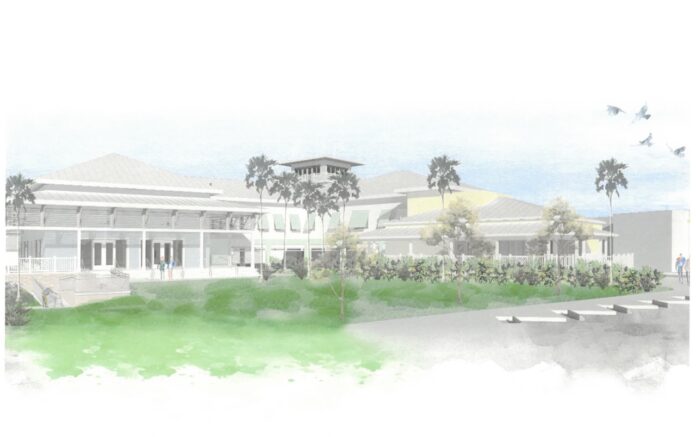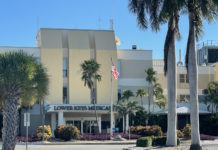
After years of debate that have driven a wedge between Key Colony residents and city officials, a 3-2 vote by the Key Colony Beach Commission on July 20 will move the city toward the construction of a brand-new city hall building, much to the audible chagrin of several residents present at the nearly five-hour meeting.
The commission’s session opened with public comment and reports of written communication received by the city from residents staunchly opposed to the new building, once again urging the city to repair its existing city hall – left largely vacant since Hurricane Irma – or put the proposed new building out to bid a second time.
A bid opening on June 5 revealed two bids submitted from a total of 34 planholders for the proposed building, designed by Coral Gables-based architectural and engineering firm LIVS Associates: an $8.375-million figure from Miami-based Hands On Builders LLC (HOB), and a $12.487-million bid from Mobile, Alabama-based Persons Services Corporation (PSC).
The city conducted a subsequent bid evaluation meeting on June 28, during which one of the three intended committee members, architect and KCB resident Pete Diez, was dismissed from the committee due to prior private conversations with bidders. From the remaining evaluators – LIVS architect Lazaro Cabezon and retired former KCB Building Official Terrence Justice – HOB’s bid received a total of 187 out of 200 points, with PSC’s score at 181. Both evaluators wrote that PSC’s entry should be disqualified as a non-responsive bid due to a math error on the company’s bid form.
“LIVS recommends this be put out for re-bid; it will benefit the city to get more bids,” Cabezon’s evaluation sheet reads. “But if you decide with the low bidder then HOB should get the job.”
“Commission recommendation is to award to HOB or publish a new solicitation,” Justice wrote, while “strongly advising” local project oversight by a city-appointed representative as well as a mandatory performance bond.
The limited responses, difference of more than 40% between the bid prices and committee recommendations for a re-bid of the project, in the absence of an updated bid to repair the existing building, continued to draw residents’ ire throughout the meeting. Some cautioned the commission to broaden its allowances for change orders in its financing projections for the new building given the vast difference between the two bids received, recommending allowances of 15 to 20 percent over the currently-budgeted 5 percent.
Several voiced complaints regarding the city’s handling of completed bid packets. According to Florida state law, a governing body must release the contents of competitive bids to public records requests within 30 days of opening the bids or at the time a decision is made, whichever is earlier. If the agency decides to reject all bids, the contents of existing bid packages are exempt from disclosure for up to 12 months after rejecting the bids or until the time the governing body reaches a final decision, whichever is earlier.
As KCB opened its city hall bids on June 5 and considered rejecting all bids after its evaluation meeting on June 28, but did not reach an official decision until its July 20 city commission meeting, it’s unclear whether the bids were subject to public inspection under Florida law after July 5. Several residents, along with commissioner Freddie Foster, said they had requested the bid packages immediately, but only received them a few days before the commission meeting.
The commission had an extensive exchange with Justice on Thursday following a recommendation from a LIVS representative to re-bid the project. Due to technological challenges, the commission was unable to continue its discussion with LIVS beyond a brief recommendation.
Justice said he was “troubled” by the two bids with a large discrepancy, calling the option to re-bid the project an “attractive option to revisit this,” but said he “openly acknowledge(d) that this comes to the commission’s discretion, and you do have the option to award to the low bid of $8.375 million.”
Foster and commissioner Joey Raspe questioned the disqualification of PSC’s bid, saying that the reported “math error” was likely a typo on the company’s bid sheet and that changing a single digit virtually corrected the error within a few dollars. They said HOB’s bid package contained similar typos that were simply located in other places than the company’s signed and notarized final bid sheet.
“I had this loaded into an Excel spreadsheet, but the number that it took in the line item that ostensibly had a typo, I couldn’t arrive at the stated bid price without putting a completely different unrecognizable series of digits. It was not a one-digit typo.” Justice replied. “Math cannot be corrected, because it’s tantamount to changing the number of the bid.”
Justice also replied to concerns from Raspe that the new city hall project would far exceed the scope of HOB’s current projects, reiterating a performance bond and local supervision as absolute requirements. He said HOB’s lack of experience did not trouble him as much, as a large portion of the work would be handled by subcontractors.
“It is (a concern), but (the evaluation committee) is limited to assessing their qualifications,” Justice said. “Their bid was responsive, so we didn’t really go beyond that. I won’t say that your concern is misguided at all. … But I didn’t think for a moment that the commission would say, ‘Let’s give it to a more experienced company, and let’s spend 50% more.’” He reiterated his advice for the commission to view a performance bond and local oversight of the build as absolute necessities given the scope of HOB’s prior projects.
Raspe noted a lack of bids from local commercial contractors as a red flag, saying he “(didn’t) understand why we’re putting this project in the hands of a residential builder.”
“I’m at a loss,” said Foster. “I can’t believe that we’re entertaining this. … I just don’t understand how people, especially without a construction background, could come down this path. … I have to oppose this at the highest level.”
“The reason I’m supportive of trying to move ahead is that … we did get a bid that was 4.6% of what we budgeted,” said secretary/treasurer Tom Harding, adding that from his time on the city’s utility board, such large discrepancies between bids were commonplace. He attributed the lack of bids to contractors’ desire to pursue larger projects on Florida’s west coast and in other municipalities throughout the Keys.
In a detailed address citing numerous engineering and inspection reports covered in the June 8 issue of the Marathon Weekly, Vice Mayor Beth Ramsay-Vickrey described extensive damages to the existing building and several challenges to pursuing a repair, instead of a rebuild, of the existing hall. She said that from her understanding, regardless of when the prior city hall’s floor began sinking – a topic of heated debate among current and former residents and city officials – the hall’s condition after Hurricane Irma warranted a rebuild. She referenced agendas and meetings for city commissions and committees dating back to 2005 discussing the need to replace the building with a fully hurricane-resistant structure.
“FEMA only cares that it is substantially damaged,” she said. “For the purposes of financial reimbursement, yes, FEMA cares about how the damage occurred. But for the declaration of substantial damage … which would require the old building to be elevated and brought up to all applicable updated codes, they don’t care how it was damaged.”
She spoke against a possible re-bid of the project and said she was concerned that HOB could return with a higher bid and “pocket (millions) for his time and trouble,” knowing no other contractors had submitted bids close to the company’s original figure.
“I will be voting one, in accordance with FEMA’s 50% rule … Two, to ensure that we remain in compliance with federal regulations in order to protect our city’s standing in the National Flood Insurance Program. Three, to ensure our good standing with both FEMA and the state, and four, to ensure our position for future state and federal funding,” she concluded.
The commission ultimately voted 3-2 to accept HOB’s bid, with Raspe and Foster as the “no” votes. Though unclear during the meeting whether a performance bond would be a mandatory condition of the project award as suggested by Justice, City Administrator David Turner and Ramsay-Vickrey both confirmed to the Weekly via text that the bond would be required.
Harding’s city hall construction financing plan, presented later in the meeting and based on a listed building cost of $8 million, called for financing needs of between $2.2 million and $2.5 million to pay for the new hall, depending on how much of the city’s general fund cash would be used. The city’s expected revenues include a $2.2 million facility hardening grant already received from the State of Florida and another $2.2 million in available infrastructure cash. Although based on the lower-priced building, Harding’s plan calculates a per-resident cost of between $2,649 and $3,174 over a 20-year loan period.
























